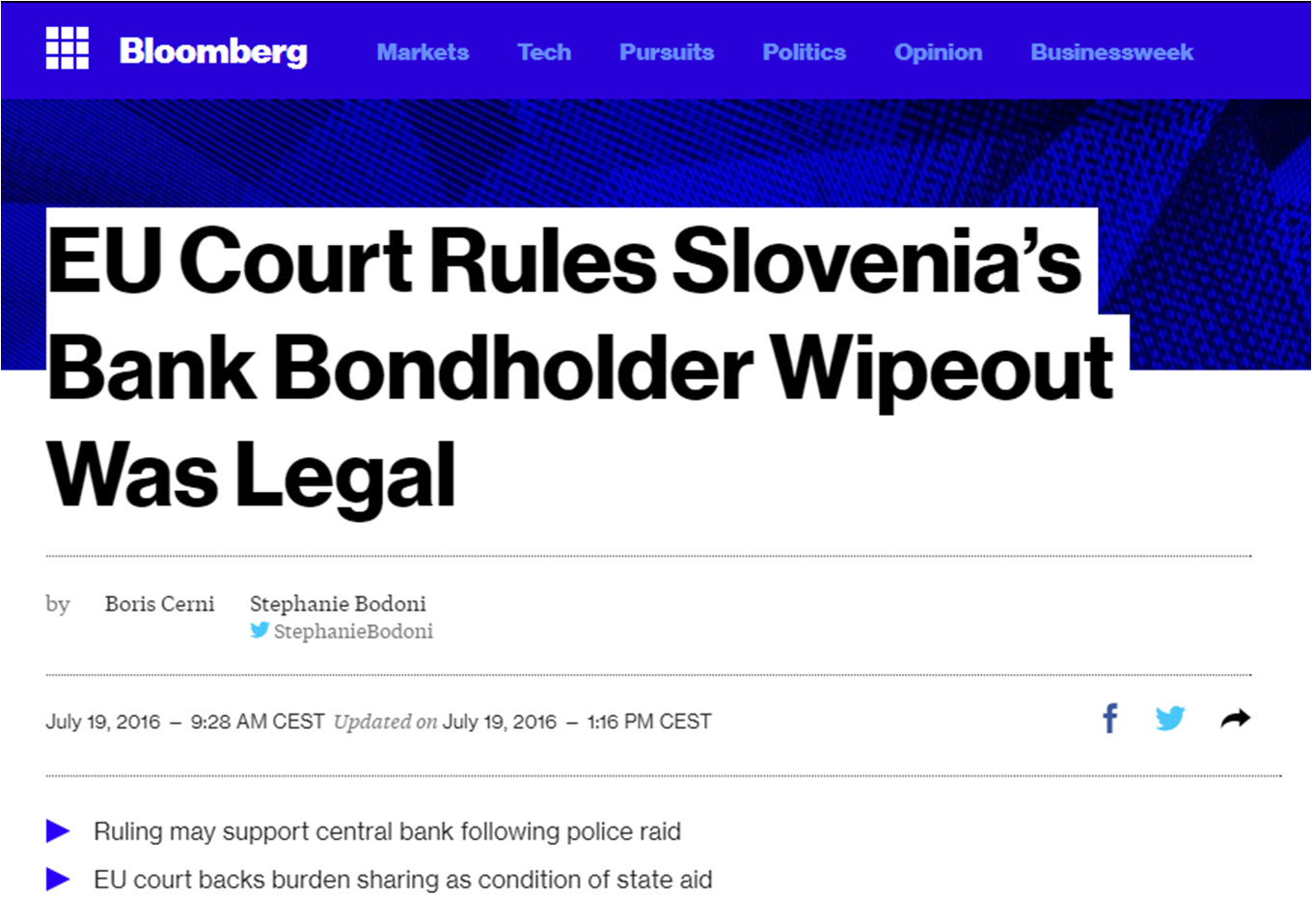- Medij: Bloomberg
- Datum objave: torek, 19.07.2016

Ruling may support central bank following police raid
EU court backs burden sharing as condition of state aid
Share on Facebook
Share on Twitter
The European Union’s highest court ruled that Slovenia broke no laws when it imposed so-called “burden-sharing” in the 2013 banking rescue that wiped out about 600 million euros ($664 million) of bondholder debt.
The ruling may lend support to the euro member’s central bank, led by Governor Bostjan Jazbec, after it was raided by Slovenian police earlier this month on suspicion of wrongdoing during the bank rescue. The 3.2 billion-euro bailout was engineered during the European sovereign-debt crisis by Jazbec and then Prime Minister Alenka Bratusek’s cabinet to save the Adriatic nation from having to ask for an international aid lifeline like those taken by Greece and Ireland.
The judgment strengthens the hand of Brussels regulators as Italy fights to shield bondholders in that country’s banking crisis. But it leaves some questions unanswered in Slovenia, whose Constitutional Court is presiding over a case filed by subordinated debt holders trying to recoup their losses. The EU court ruling was prompted after the Slovene tribunal asked for clarity on a 2013 EU banking communication aimed at guarding taxpayers from paying for bailouts.
“This is a positive ruling for Bank of Slovenia, the state and the taxpayers,” Saso Stanovnik, an analyst at Alta Invest in Ljubljana, said by e-mail. “However while the battle is won, the war will most likely continue.”
The yield on the Adriatic state’s bonds maturing in March 2026 fell one basis point to a record low 0.82 percent in Ljubljana at 12:40 p.m., according to data compiled by Bloomberg.
For story on wider EU Court of Justice ruling on state-aid rules, click here
While Tuesday’s ruling said Slovenia didn’t break the law by imposing losses on debt holders, it said burden-sharing wasn’t a pre-requisite for state aid. That leaves room for interpretation in the case that Slovenia’s top court will rule on by the end of the year.
In Brussels, the European Commission said the ruling confirmed the bloc’s guidelines, arguing that they “serve to limit the amount of state aid granted to what is sufficient” and that otherwise it “would be likely to cause distortions of competition in the internal market.” Slovenia’s central bank said the court decision confirmed that the commission determines general rules for approving state aid and that it can reject such measures if an individual country doesn’t follow them.
On the other hand, Kristjan Verbic, president of the PanSlovenian Investors’ and Shareholders’ Association, said the ruling confirmed their view that the EU rules weren’t binding, which they may use as an argument in their Slovenian case.
“The question for the court wasn’t if the communication from the European Commission is valid or not,” Verbic, whose group represents about 700 people whose junior debt was erased and 2,000 shareholders involved in the wipeout, said by phone. “The question was if it was binding for member states and it clearly wasn’t, so we’ve won.”
Proof Burden
Following the July 6 raid on the central bank, the regulator called on the country’s prosecutor to conclude its probe as soon as possible. Both the bank and former Finance Minister Dusan Mramor, who resigned last week, have sided with European Central Bank President Mario Draghi in calling the police probe as an attack on the monetary authority’s independence.
Prime Minister Miro Cerar’s cabinet is planning to sell state-owned banks to try and recoup some of the cost of boosting capital at state-owned Nova Ljubljanska Banka, NKBM and Abanka after 2013 stress tests unveiled shortfalls and triggered the rescue. Slovenia later set up the Bank Asset Management Company to take over lenders’ non-performing assets.
Now Slovenia’s top court must ascertain whether the 2013 bailout “was well thought out, transparent and convincingly justifiable as well as necessary,” Andraz Tersek, a constitutional law expert at the Faculty for Humanistic Studies in Koper, Slovenia, said by e-mail. “The burden of proof will be on the central bank.”
- Medij: Bloomberg
- Avtor: Stephanie Bodoni, Boris Cerni
- Datum objave: torek, 19.07.2016
- Povezava: http://www.bloomberg.com/news/articles/2016-07-19/eu-court-ruling-backs-slovenian-move-that-wiped-out-bondholders










